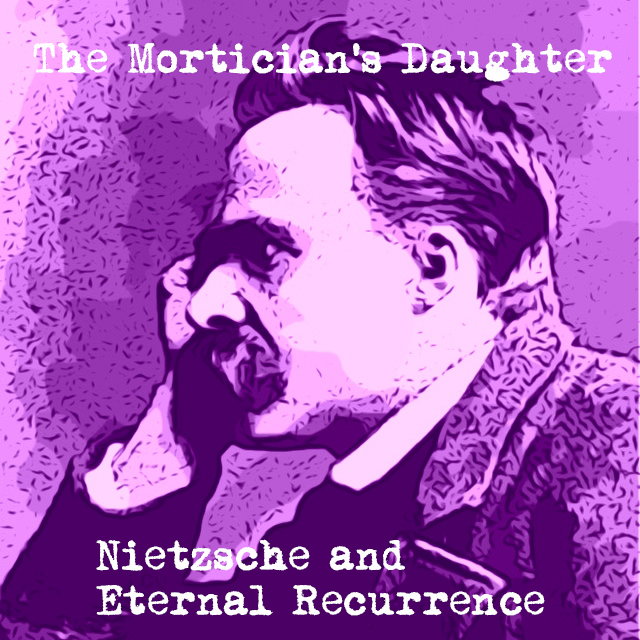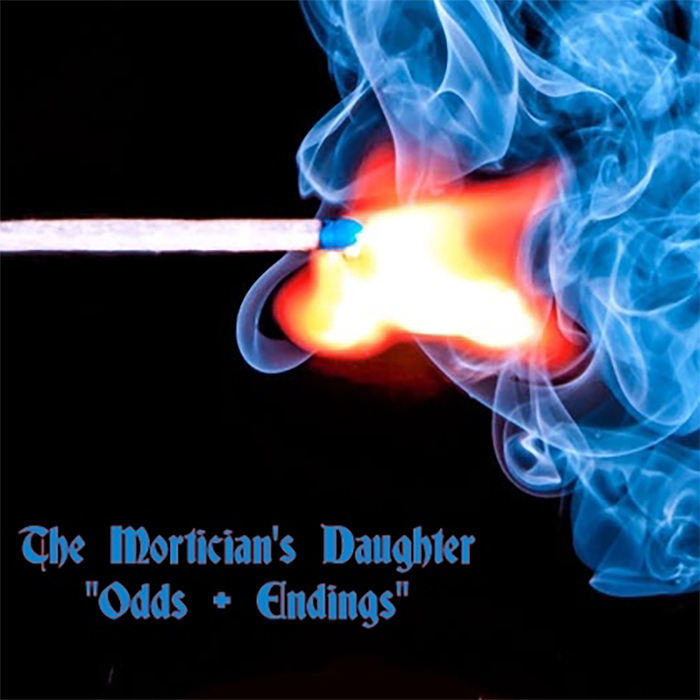Episode Transcript
Good day, deviants! So many things afoot down at our podcast headquarters these days. As humans of the world start congregating again, we’re excited to see what happens in our studio now that we can start letting the voice actors out of their cages so make sure you’re following along with YabYum online at yabyumwest.com or on the socials at yabyumaz… You can also find me, The Mortician’s Daughter, on FB and Insta at MorticiansDaughterPod or Mortician Da Pod on Twitter. If anyone is still on social media these days.
Okay. With housekeeping out of the way, let’s get this party started.
Maybe because when I was a child I was always told I was born to an unlucky family, I grew to like other things considered unlucky and started to take them as good omens. Ravens, crows, black cats crossing my path, saying MacBeth in the theatre, broken mirrors, deleting ALL chain letters, and the number 13.
And this episode just so happens to be Lucky Number 13 so I thought this would be the perfect time to explore my lucky number and the superstitions surrounding it.
I have to say, there are some other reasons for the favoritism I show the number thirteen beyond its bad reputation for being an unlucky number. There are thirteen moon cycles in one earth year. A baker’s dozen is 13 and it means a free bagel. There are 13 letters in my name. I have a tattoo of the number 13 and I got married on Friday the 13th, in October, of course. And the list goes on.
But how far back does the fear of the number 13 go, you might be wondering?
Barbara Maranzani wrote that “An early myth surrounding the origin of the fear involved one of the world’s oldest legal documents, the Code of Hammurabi, which reportedly omitted a 13th law from its list of legal rules.” Now, most scholars attribute this to a clerical error, but that doesn’t stop people from wondering.
And 13 was associated with death in Ancient Egypt which might have freaked out some people, even though those same Ancient Egyptians saw 13 as lucky, maybe, because they didn’t think of death as a bad thing.
Additionally, the ancient Persians who followed Zoroastrianism believed that chaos would begin in the 13th Millennium.
More recently, gallows are said to traditionally have 13 steps, although according to an article for Mental Floss, “A park ranger at Fort Smith Historic Site once said, "[There were] 13 steps on the gallows—12 up, and one down."” Seventy-nine people took those 13 steps at Fort Smith to their death after receiving sentences from the Hanging Judge - Isaac Parker - who died in 1896. Rumor has it that the ghost of the judge haunts the courthouse, maybe right where those 13 steps once stood.
And while we’re talking about the number 13 and its reputation as a bad omen, we cannot forget those superstitious sports fanatics. Dan Marino, who is considered one of the greatest quarterbacks of all time, never won a Super Bowl just as Steve Nash, a two-time NBA MVP, never won a championship. Both were given #13 on their jerseys. Coincidence? You decide.
Now, when it comes to the much maligned number 13, athletes have refused the jersey number, hotels across the country and around the globe refuse to include it when assigning floors or room numbers, and the list goes on. Really. For realz.
“According to the Stress Management Center and Phobia Institute in Asheville, North Carolina, more than 80 percent of hi-rise buildings in the United States do not have a 13th floor, and the vast majority of hotels, hospitals and airports avoid using the number for rooms and gates as well.”
Now, that might seem silly to some, but it’s estimated that roughly 1 out of ten people (or, more specifically but not really, somewhere between 8 & 15%) in the United States has an aversion, or outright fear, of the number 13 and that often goes hand in hand with fear of Friday the 13th.
In fact, there are apparently enough people who share this fear that there’s a name for it. Paraskevidekatriaphobia, a word I had to spend twenty minutes learning to say, is a fear of Friday the 13th and paraskevidekatriaphobics are much more prevalent than you might suspect.
For a bit of history about the word itself, let’s turn to the MacMillan Dictionary which explains, "The term paraskevidekatriaphobia was first coined in the early nineties by Dr. Donald E. Dossey, an American psychotherapist specializing in phobias and stress management, who reputedly claimed that when someone was able to pronounce the word they were cured. The term is based on the Greek words paraskevi ('Friday') and dekatria ('thirteen') with -phobia as a suffix to indicate 'fear'."
The word friggatriskaidekaphobia is interchangeable with Paraskevidekatriaphobia, but it takes it’s root from the Norse goddess, Frigga or Frigg.
Now, let’s just pause and take a step to gain a broader picture of how this fear can affect the larger world. To do so, let’s go back to the Stress Management Center and Phobia Institute in Asheville, which explains that “U.S. companies will lose $800 million to $900 million in business owing to paraskevidekatriaphobes who refuse to travel or go to work on Friday the 13th.”
Well, I guess if 17-21 million Americans opt to stay home on Friday the 13th, that’s going to have an impact on the economy. But nearly a billion dollars in revenue lost every year just because folx get spooked about the number 13? That’s kinda crazy, but you know humans, the crazy isn’t going to stop there.
Fridays have their own bad reputation and when you cross that with the number 13, it gets double plus bad.
How this originated is the topic of much conversation. Well, probably some conversation.
One possible source many point to had to do with the Knights Templar.
It was October, Friday the 13th, when King Philip IV of France commanded the dismantling of the Knights Templar, the warrior monks of the Crusades. This decree led to the torture, imprisonment, and death of those Knights over the next seven years until their order was deemed no more. Supposedly. Since then, the Knights Templar have made several appearances in both fiction and conspiracy theories alike, leaving me to wonder if King Philip IV really accomplished what he set out to do. I mean, afterall, the Knights Templar burn brighter in the minds and imagination of people than that one particular King of France from the 1300s. Oo, look, another 13.
Another possible starting point for the ominous feel of Friday the 13th? Christians will often point in the following direction.
See, it’s believed that Jesus of Christendom was crucified by the Romans on a Friday and he had 13 attendees at his Last Supper. The 13th guest to arrive at that meal? Judas. Obviously.
And if we hop back to Norse mythology for a minute, we can find two instances of the big bad-bad associated with the number and day. Let’s start with the 13 part.
Now, according to legend, there was a big to-do with all the gods in Asgard. The trickster Loki showed up at this banquet uninvited as the 13th guest and began making demands. This is where things get sticky and another god, Baldr, ends up dead with Loki to blame. Indirectly, of course.
We find in the Encyclopedia Britannica that “Icelandic stories tell how the gods amused themselves by throwing objects at [Baldr], knowing that he was immune from harm. The blind god Höd, deceived by the evil Loki, killed Balder by hurling mistletoe, the only thing that could hurt him. After Balder’s funeral, the giantess Thökk, probably Loki in disguise, refused to weep the tears that would release Balder from death.”
Baldr was beloved by the gods for his beauty and his good nature and his death was not just a tragedy for the gods, but also a harbinger of Ragnarök. Yep, that Ragnarök, the end of the world Ragnarök. So, basically, everyone was pretty ticked off at Loki at this point.
Alrighty, short aside, to take a lesson from both Christian and Norse mythology, never ever have 13 people sit down to dinner together. Twelve is the limit. Maybe 14, but never 13.
Now, Baldr was the son of Odin and Frigg. You remember Frigg? From the word friggatriskaidekaphobia? Yes, that Frigg or Frigga. Frigg of Friday. She’s often connected to witchcraft for her skills as a seer and practitioner of magick known as seiðr. This form of magic relates to both the telling and shaping of the future. Frigg lives in her own hall in a land of mist and spends her time spinning clouds.
That sounds pretty cool to me, but witchcraft has been largely frowned upon for most of history. SO Frigg, Friday, witches, evil... or something like that.
Friday’s gotten such a bad rap over the years that it’s been said that Eve gave Adam that troublesome apple on a Friday and Abel was also killed by his brother Cain on a Friday. Not the same Friday, obviously.
When it comes to the superstitious, Friday the 13th is always something to be wary of. In fact, the British Medical Journal conducted a study to determine if there was a relationship between health, behavior, and superstition in correlation to Friday the 13th.
To do this, they relied on data that included numbers of vehicles on motorways; numbers of shoppers in supermarkets; and hospital admissions due to accidents.
“The study reported the surprising finding that, despite the fact that fewer people chose to travel on Friday 13th, there were significantly more hospital admissions due to accidents than there were on 'normal' Fridays!”
That’s interesting. Very interesting.
So does that mean that Friday the 13th is actually unlucky? Or maybe it’s just because people think about it as an unlucky day that makes it so? Like, a constructivist thing? No way to be sure, but the study did conclude that “Friday 13th is unlucky for some. The risk of hospital admission as a result of a transport accident may be increased by as much as 52%. Staying at home is recommended.”
Let’s pause to look at some historical events that have taken place on Friday the 13th. Maybe that will help us understand if the day, by its very nature, is the problem or if the growing superstition surrounding such days is the problem.
Yes, good idea. We’ll conduct our own study - right here, right now!
Okay, let’s get this rolling:
The Germans bombed Buckingham Palace on Friday, Sept. 13, 1940. That’s bad.
Spielplatz, which is generally considered the first nudist colony, opened in Bricket Wood, England, on Friday, June 13, 1930. Uh, that’s good?
A storm killed 300,000 people in Bangladesh and caused flooding along the Ganges delta which killed as many as 1 million people on Friday, November 13th, in 1970. That's way bad.
One of America’s nastiest people in history - Confederate general/slave trader/Grand Wizard Nathan Bedford Forrest was born on Friday, July 13, 1821. That’s super bad too.
But the accordion was patented by Anthony Foss on January 13, 1854. Good, right?
Uh, and the Olsen twins were born on Friday, June 13, 1986.... I don't honestly know where to put this. Not bad? How about we just go with not bad.
Tupac Shakur was murdered on Friday, September 13th, in 1996. Bad bad bad.
Benjamin Franklin wrote the famous line: “Everything appears to promise that it will last; but in this world nothing is certain but death and taxes” on Friday, Nov. 13, 1789.” That’s another mixed bag. Poignant observation about the cruel truths of living. Ummm… Once again, not sure where to stick this one.
Well, my study has some flaws. I won’t be submitting it for academic review any time soon.
The ominous feelings that frequently accompany Friday the 13th might also have something to do with the way the date gained popularity amongst the general public.
According to Live Science, “In 1907, author Thomas William Lawson put together the notion of unlucky Friday and unlucky 13 with the novel "Friday the 13th," a tale of an unscrupulous broker taking advantage of superstition to game the stock market on that date.”
Now, Lawson probably didn’t kickstart the unlucky history here, but he helped it gain recognition, much like the movie franchise that shares its name. Friday the 13th came out in 1980 - on Friday the 13th, of course. The movies inspire fear as they follow Jason Voorhees, a hockey mask wearing murderer, on his violent rampages.
Now, I’m not keen on too many superstitions, and because my anniversary is on Friday the 13th, I insist we celebrate every Friday the 13th… not just the one in October… so I look forward to every time a Friday lands on the 13th day of the month.
Interesting sidenote: the number 4 is avoided throughout much of Asia, just as many of us in the “West” have an aversion to 13. Fear of 4 is called tetraphobia. Which is a lot easier to say than Paraskevidekatriaphobia.
Like I said, not much one for superstitions, although I never light three cigarettes on one match… not that I’m lighting many cigarettes these days. Are there any smokers left? I don’t know. Not even me. Fran Leibowitz maybe.
No, I’m kidding, there are smokers out there in the world. I’m just sad to say I’m not one of them these days. STILL, never light three smokes from the same strike, be it lighter or match. That’s not superstition. That’s just being smart.
Maybe we’ll get to the exact reasons why in a later episode, but that’s all we have time for today. So, until we meet again, I wish you strange dreams to end strange days.
Thanks again for listening and thanks to Devin and Mark for their mad production skills.


